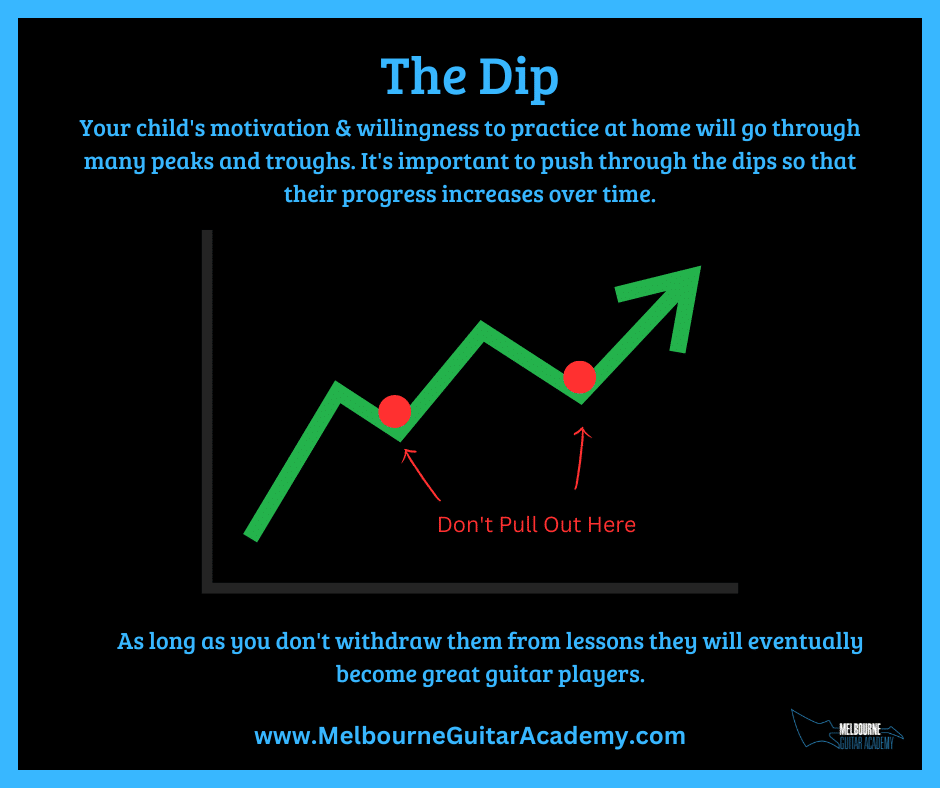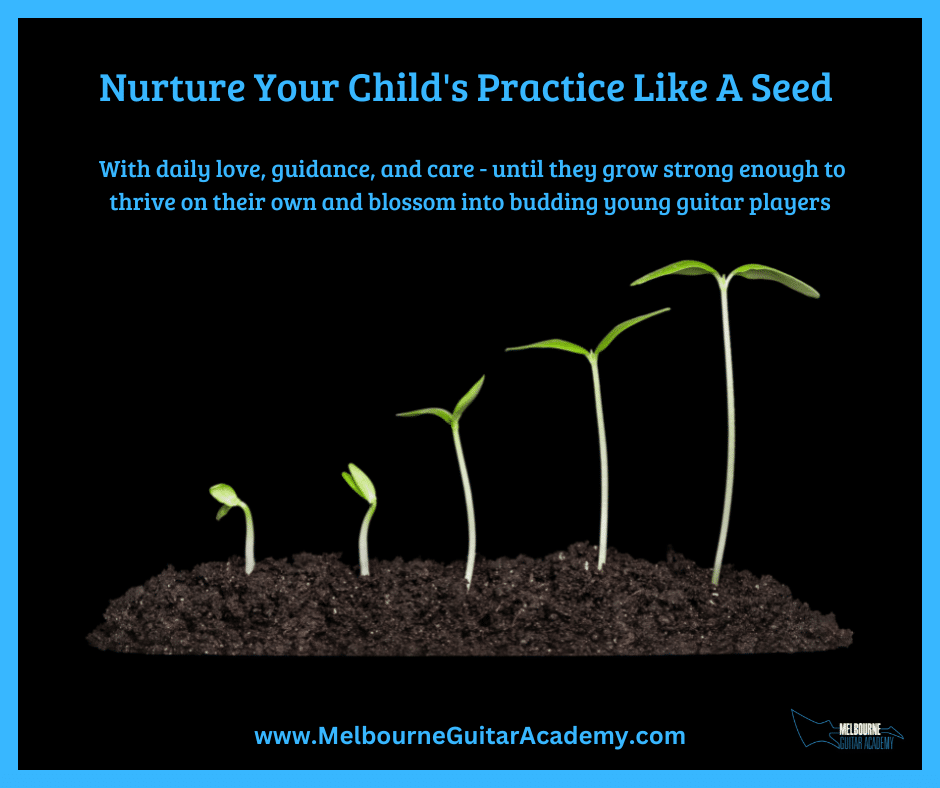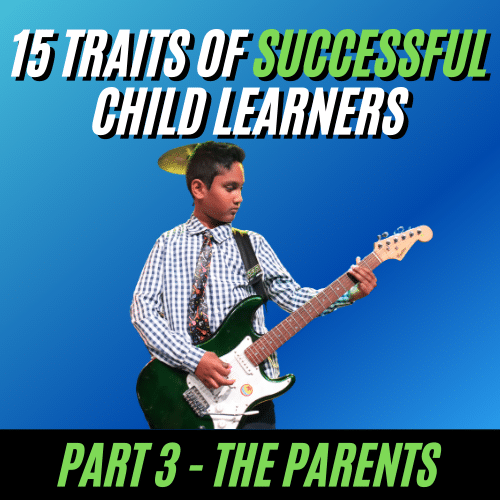Unlock Your Child’s Potential With The 5 Habits of Highly Effective Music Parents
Welcome to the third and final part of our series on what makes young music students successful.
In part 1 & part 2, we discussed 10 habits and behaviours of successful young musicians, and the importance of investing in quality instruments, maintaining a long-term commitment to your kids’ guitar lessons, and understanding the ups and downs of motivation.
Now, we turn our focus to the role that parents play in the success of their child’s music education.
While every child is unique, there are certain traits that parents of successful young musicians tend to have in common.
In this article, we will explore five of these traits, with insights and advice from professional guitar teacher and children’s guitar lesson specialist, Michael Gumley.
Whether you are a seasoned music parent or just starting out on your child’s musical journey, these tips can help you support your child’s growth as a musician and create a positive, enriching learning environment.
So let’s dive in and discover what sets successful music parents apart!
Good Parents Invest Into Quality Instruments For Their Kids Guitar Lessons
The biggest mistake that parents make when their child starts guitar lessons is buying the cheapest instrument possible.
Yes, sometimes budget can be an issue but most parents go with the cheap option so that it’s not a total loss if the child pulls out of lessons after a few weeks or a few months.
While it might seem like a safe option given the transient nature of kids and how many activities they try before settling, this indicates that the parent isn’t optimistic about the long-term potential of their child and is already thinking about them quitting.
They have basically lost the battle in their own mind and aren’t even going to try and keep their kids in lessons long-term.
A Good Quality Guitar Makes Learning Easier
On the other hand, buying a high-quality instrument shows that the parent is committed to this endeavour and wants to do everything they can to ensure it’s a successful venture long term.
After all, having a high-quality instrument and equipment can make a big difference in a young musician’s progress and success.
Not only are they easier to play, but they also sound better and are more likely to capture your child’s interest during the crucial early days.
Parents can support their child’s music education by investing in a good-quality instrument that is suitable for their child’s skill level and musical goals.
This may include purchasing or renting a well-made instrument, as well as investing in equipment such as tuners, metronomes, and music stands.
So when it comes time to buy a guitar, set your budget and buy the best guitar that you can with the money you have.

They See Their Kids Guitar Lessons As A Long-Term Investment
Learning to play an instrument and becoming a successful musician takes time, practice, and dedication.
Parents can help their child succeed in music by recognizing that music education is a long-term investment and committing to supporting their child’s musical journey over the long haul.
This means being patient and understanding that progress may be slow at times, but also recognizing that the benefits of music education can be lifelong.
Parents should avoid pulling their children out of guitar lessons prematurely, as this can disrupt their progress and hinder their ability to achieve success in music.
I’ll often have parents say to me “we’re pulling them out of lessons because they aren’t doing the practice at home to justify the cost”
To that I say “do they practice their swimming lessons at home? What about their football practice, dance lessons or coding?”
(we won’t even mention getting them to do their school homework)
Realise That It’s Going To Take Years To Become Good At Guitar
We often leave our kids in some activities for decades with no practice at home because it’s not expected or there is no means of doing it…
But when it comes to music lessons how much they practice (or their resistance to it) is used as the yardstick.
If you want your child to be successful they need to stick with it long enough to become successful!
This is likely going to be four or five years for most beginners to get truly comfortable with the guitar.
Many of my best students barely touched the guitar for the first 3 years when it was hard. Once their skills went over a certain threshold and guitar became easy, then they couldn’t put it down.
If there is one thing all the parents of my best child guitar students have in common, it’s that they committed to the long term and didn’t withdraw their kids from lessons just because their kids went through a phase of low motivation.
Successful Parents Recognise Periods Of Low Motivation And Push Through Them
Learning to play an instrument can be a challenging and often frustrating experience, especially for kids who are still developing their fine motor skills.
Young musicians may experience periods of low motivation or even a lack of interest in music altogether.
It’s important for parents to recognize that these phases are normal and that they will often pass over time.
So don’t pull them out of their guitar lessons too early, take a different approach.
Make Practising Guitar Fun
Instead of pressuring their child to continue practising or performing during these periods, parents can come at it from another angle and encourage their kids to practice indirectly.
This may include asking them to do a performance for family and friends, recording a video to send to grandma, inviting a friend over for a jam or setting them up with some youtube videos on guitar playing and its history.
Over time, young musicians will often regain their motivation and enthusiasm for music, and parents can help by being patient and supportive during these ups and downs in their child’s musical journey.

They Are Proactive In Helping Their Kids Set Up A Practice Routine
The life of a modern parent is very difficult. You’re overworked, underpaid, and what little spare time you have goes to getting your kids off to all their activities.
You don’t have time to teach them guitar, nor do you know how. That’s why you enrolled them in guitar lessons for kids with a real teacher.
I’m going to share with you a little secret.
While it’s important what goes on in the guitar lessons, it’s what happens in the 6 days between lessons at home that really counts.
If you have a 30-minute guitar lesson once a week, that 30 minutes is .5 hours out of a 168-hour week. This equates to .29% of their total week, or .59% should they learn guitar for an hour.
How can you expect your child to be good at something if they spent less than 1% of their time each week on it?
So what’s the solution? Two options.
You get them to stay in lessons long enough so that the small amount of time builds up to something substantial over years of taking lessons.
Or we increase the amount of time they put into guitar at home with regular practice.
Making Practice Part Of Their Schedule Is The Key
What every single one of our best parents did was help their kids establish a regular practice routine at home.
This could be as little as 5 minutes per day, or a 10-minute session every second day.
The key is to make it part of their schedule and keep the times consistent.
Try to get them to practice for 30 days consistently using a practice log in order to create a habit.
Once they have established a habit of practice and it’s part of their routine, you can extend the time.
Yes, there will be days missed and periods of low motivation, but if it’s part of their schedule then they will know it’s guitar time and won’t see it as infringing on their technology time or other leisure activities.
A Quick Gardening Analogy Which I Promise Relates To Guitar Lessons For Kids
If you’ve ever planted a seed you know that you need to really nurture and invest time into them during the first couple of weeks.
You need to water them every day and if you miss a day there is a good chance the seed will stunt its growth or die altogether.
Once your seed sprouts and grows to a certain size it can go a bit longer between watering and eventually will survive just off of rainwater without any input from you.
If we have children under the age of 12 and we’re expecting them to practice by themselves and know exactly what to do, it’s like planting a seed and expecting the seed will be able to water itself.
It’s just not going to happen.
We’ll have to nurture them every day until they can become more independent in what they are doing.

They Recognise Music As A Life-Long Journey That Provides Many Additional Benefits
Every day people come to me saying “I used to play guitar as a kid and I really regret giving it up”
I’m yet to have a single person tell me they regret learning how to play guitar.
Learning to play an instrument is a skill that can bring joy and satisfaction throughout a person’s life.
Unlike many other hobbies or sports, which tend to become less appealing or too physically demanding as people get older, music has the potential to be a lifelong pursuit that can bring fulfilment and enrichment to a person’s life for years to come.
(Plus the older you get the better you become)
It’s also worth pointing out that research shows many benefits to learning a musical instrument including:
- Improved Academic Performance
- Increased memory capacity
- Increased cognitive skills
- Increased development of fine motor skills
- Increased confidence
- Increased communication skills in group settings
- A great reliever of stress
- An avenue for creativity
- An avenue for identity & self expression (especially important in teenage years)
So in addition to musical talent, your guitar lessons for kids have so many additional benefits!
Study Proves Link Between Learning Guitar And Higher Academy Achievement
A recent study of 112,000 high school students in the USA found that most of the high-performing students who excelled in Maths, English and Science all took music lessons and played in ensembles.
These benefits alone is reason to keep your students in guitar lessons for the duration of their high school years.
So while we might feel like our investment into the music lessons themselves is unjustified by a lack of practice at younger ages (when kids don’t want to do anything other than play their video games). We instead need to look ahead to their teen years and see all the additional benefits our child will receive from learning.
In Conclusion
While we often want as little to do with our kid’s activities as possible so that we can enjoy the little spare time that we do have, every single parent of a successful child learner has been actively involved in the learning process for their kids.
Your child’s guitar lessons make up less than 1% of their week so in order to see significant results you need them to stick with lessons long enough to accumulate time or set up an environment at home that is conducive to consistent practice. (or both).
We will need to help our children develop the habits and routines needed for long-term success, and will also need to develop some habits, behaviours and ideas ourselves in order to ensure the long-term success of our music lessons.
If you put in a little bit more effort on your end, you’ll be amazed at the difference it makes both short-term and long-term.
About The Author

Michael Gumley is a professional guitar teacher and children’s guitar lesson specialist with over 15 years of teaching experience.
He has taught children of all ages, and many of his students have gone on to become successful musicians in their own right.
Michael is passionate about music education and believes that anyone can learn to play guitar given the right guidance and a long enough period of time to become good at it.
If you’re looking for guitar lessons near me for your children, or aren’t happy with the progress your child is making with their current teacher, consider taking guitar lessons with Michael and his team at Melbourne Guitar Academy.

